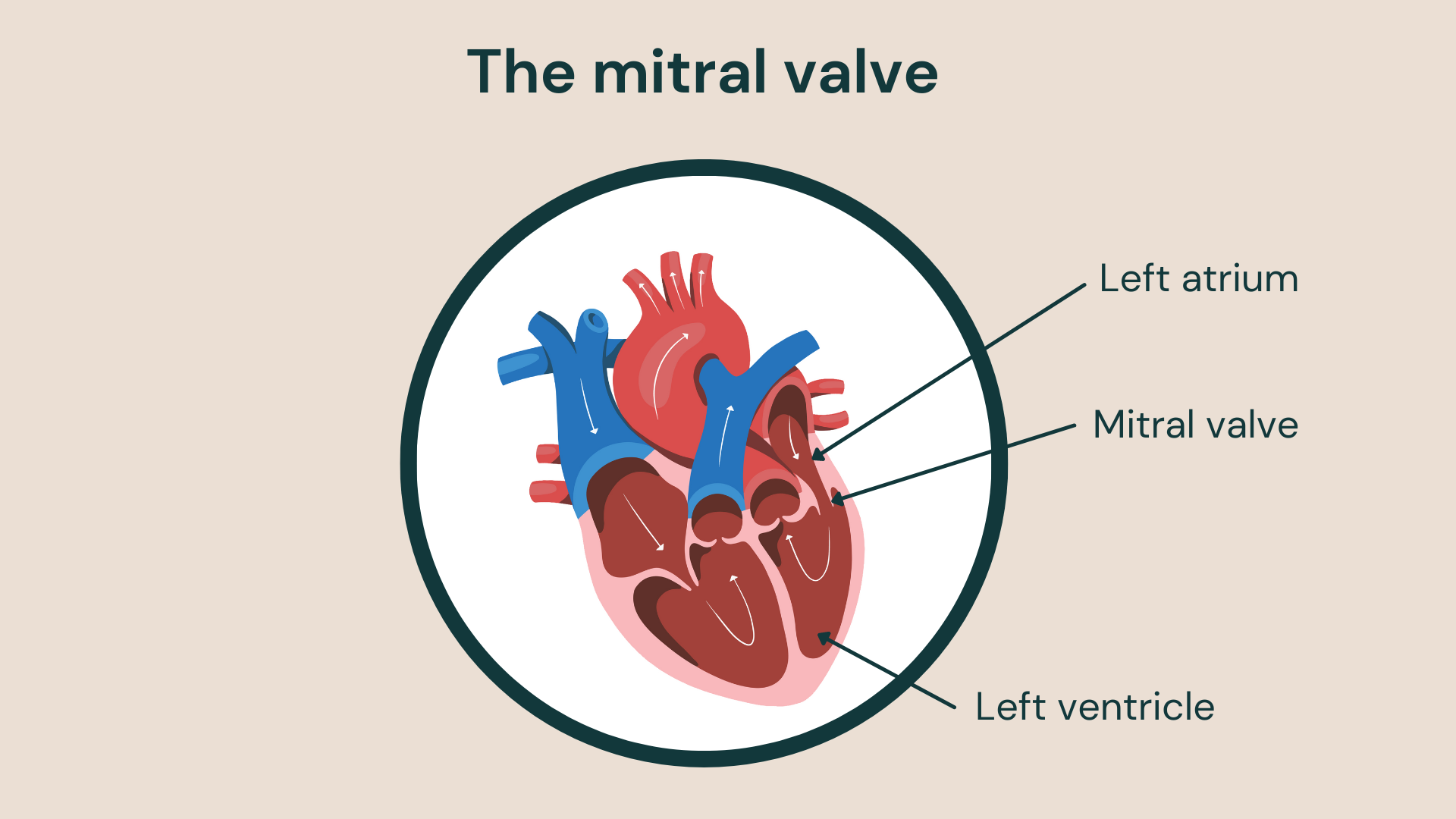Mitral regurgitation is the most common heart valve problem worldwide. It is a dysfunction of the heart’s mitral valve. In mitral regurgitation, the valve does not shut effectively, allowing blood to flow in the wrong direction, back towards the lungs. Mitral regurgitation is also known as mitral insufficiency or mitral incompetence.
What is the mitral valve?
The mitral valve is one of the heart’s four valves; it works to keep blood flowing in the correct direction through the heart. It is a structure with two flaps of tissue located between the left atrium and the left ventricle.
The mitral valve acts as a gateway between these two chambers, opening and closing as your heart beats. When the ventricle relaxes, the valve opens to let blood flow from the upper chamber into the lower chamber. A healthy mitral valve should close when the ventricle contracts to stop blood from flowing backwards into the atrium and towards the lungs.

The mitral valve is one of the heart’s four valves; it works to keep blood flowing in the correct direction through the heart.
What happens in mitral regurgitation?
If you have mitral regurgitation, your mitral valve becomes leaky as the valve can’t close tightly. When the left ventricle contracts to pump blood around the body, blood leaks back or regurgitates into the left atrium which receives oxygenated blood from the lungs.
When the mitral valve is leaky, your heart has to work harder to pump the same volume of blood around the body as a normal heart. This extra strain causes damage over time and makes the left ventricle become larger and eventually weaker. Additionally, because of the mitral valve not shutting fully, the high pressure generated in the left ventricle during contraction (systole) gets transmitted back to the left atrium and the blood vessels of the lungs which are not designed to deal with high pressures. If your mitral valve disease is untreated, it could cause complications, including heart failure and abnormal rhythms that may be life-threatening.
Mitral regurgitation symptoms
If you have mitral regurgitation, you may not notice any symptoms. However, mitral regurgitation can affect blood flow to your body, causing fatigue. Symptoms include:
- tiredness
- dizziness
- chest pain
- palpitations – a feeling like your heart is skipping a beat, racing or beating too hard
- shortness of breath on exertion and in more advanced cases, on lying flat
- swollen feet and ankles
Mitral regurgitation complications
If your mitral regurgitation is untreated or severe, you are at risk of developing serious complications.
- Heart failure: The leaky valve strains the heart, making it work harder to pump blood effectively. Over time the heart can fail, which means it can’t deliver the blood your body needs. You will feel weak, tired and breathless. You may also develop swelling in the feet and ankles and congestion in the lungs, which causes breathlessness and coughing, which is worse on lying down
- Atrial fibrillation: a fast and irregular heartbeat
- Pulmonary hypertension: Raised blood pressure in the blood vessels supplying the lungs.
- Cardiac arrhythmias: Potentially dangerous heart rhythm disturbances that cause palpitations, chest pain, dizziness, collapse and sudden death
- Endocarditis: Infection of the lining of the heart and the valve
Mitral regurgitation causes
Problems with the structure of your mitral valve may cause mitral regurgitation, known as primary mitral regurgitation. Your valve could also become leaky because of primary issues with your ventricle or atrium which is known as secondary mitral regurgitation.
Some of the common causes of mitral regurgitation include:
- mitral prolapse: a common condition in which the mitral valve becomes floppy and bulges backwards when it closes. It can develop due to degeneration with age and is the most common type of mitral valve disease in industrialised nations. You are also at increased risk of mitral prolapse if you have connective tissue problems like Marfan’s syndrome, Ehlers-Danlos syndrome and SLE
- damage by rheumatic fever: a complication of a streptococcal throat infection
- congenital heart abnormalities: structural heart problems present at birth
- endocarditis: infection of the heart lining, which can affect the valve
Secondary or functional mitral valve regurgitation can develop if the heart’s left ventricle or atrium are enlarged or if heart disease or damage affects the function of the mitral valve. Causes include:
- chronic hypertension
- heart attack causes damage to the muscles and tissues that support the valve
- alcohol abuse
- cardiomyopathy – thickening of the heart muscle
- atrial fibrillation
Mitral regurgitation usually develops gradually, with symptoms increasing over time. However, it can come on suddenly and severely if one of the tissue tendons that attach the valve to the heart wall snaps because of endocarditis or a heart attack. If this happens, you may become acutely unwell and need emergency surgery to replace the damaged valve.
Mitral regurgitation diagnosis
Experienced doctors can often pick up valve problems by assessing your symptoms and listening to your heart with a stethoscope. Mitral regurgitation has a characteristic murmur that can be heard over your heart and spread towards your left armpit. They can also arrange investigations such as:
- trans-thoracic echocardiogram
- ECG
- trans-oesophageal echocardiogram
- chest X-Ray
- cardiac MRI
- stress tests – an exercise ECG or echo can show how your heart works and what symptoms you have when you are exerting yourself
- angiography – may be performed to study the blood supply of the heart, particularly if surgery is being considered
Tests can confirm the diagnosis and assess the severity and mechanism of your mitral valve regurgitation
Mitral regurgitation treatment
If you don’t have any symptoms and your heart function is not compromised, you may not need treatment for your mitral regurgitation. Your doctor may choose to monitor your symptoms and your heart health. If you have symptoms, you may need treatment:
Medication for mitral regurgitation
Drugs can treat symptoms and prevent complications. Treatments include:
- diuretics – reduce excess fluid in the body and treat breathlessness
- hypertension medications – to lower the blood pressure
- anticoagulants – blood thinners prevent thrombosis (blood clots) and reduce the risk of stroke in atrial fibrillation
- anti-arrhythmics – treat atrial fibrillation
Surgery for mitral regurgitation
Whether you need surgery for your mitral regurgitation will depend on your symptoms, the cause of your valve problems, the severity of your disease and the impact it has had on the function of your heart and lungs. Severe mitral regurgitation, usually caused by valve degeneration is the most common reason for mitral valve surgery. Around one in ten people with mitral regurgitation due to prolapse will need surgery to repair or replace their valve.
Mitral valve repair
This is surgery to restore the function of the valve. Under general anaesthetic, your surgeon operates on the mitral valve flaps, replacing elongated or broken chords or resecting excess tissue to make the mitral valve competent again and securing the repair with a special annuloplasty ring. Mitral repair is a complex operation and may require a combination of different techniques to make the valve competent and abolish the mitral regurgitation. A successful mitral repair is a very effective procedure and brings the life-expectancy of the patient back up to the same level as their age- and sex-matched cohort.
In certain carefully selected and anatomically suitable patients the mitral valve repair can be performed minimally invasively through the left chest by implanting NeoChords on the beating heart through the left ventricle. This procedure is particularly effective for patients who need a repeat mitral valve repair.
Mitral valve replacement
This is open-heart surgery under general anaesthetic to replace your mitral valve with a prosthetic valve made of synthetic or animal tissue. This option is only selected if a repair is not possible. In some carefully selected and anatomically suitable cases of secondary mitral regurgitation, mitral valve replacement may be performed on the beating heart. This procedure is reserved for patients who are not suitable or medically unfit for surgical mitral valve replacement.
Mitraclip
Percutaneous mitral valve repair is a minimally invasive procedure to repair your mitral valve. The specialist introduces a fine, flexible tube into a blood vessel in your groin. They pass this catheter into the heart using X-ray guidance. They then attach the Mitraclip to join the two mitral valve flaps together to reduce the leak. This procedure is selected for patients who are not suitable for surgical mitral valve repair because of advanced age or other co-morbidities.
Meet our team of cardiac surgery specialists
Meet our team of cardiac surgeons specialising in treatment for aortic disease. Whether it’s maintaining heart health or implementing innovative interventions, our experts are here to offer personalised care tailored just for you.
